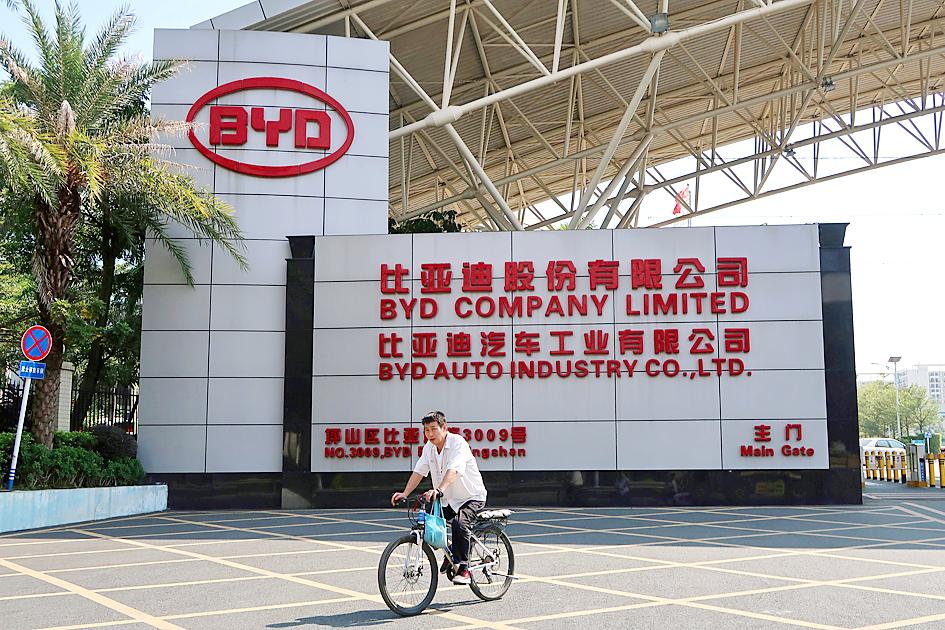BYD Co (比亞迪), the Chinese automaker backed by Warren Buffett, has come under fire for pollution at one of its factories that residents say has caused nosebleeds in hundreds of children.
Officials in Changsha, the capital of Hunan Province, sent a team to BYD’s factory to investigate gas emissions after receiving complaints from neighbors, the local government said in a statement on its Sina Weibo account on Sunday.
The team includes third-party testing institutions and experts who are to try to get to the bottom of the issue that has seen scores of parents in Changsha protest.

Photo: Reuters
One report said that more than 600 children living near the production plant in the city’s Yuhua District have experienced repeated nosebleeds since last month.
Shenzhen-based BYD said over the weekend that its emissions comply with regulations, adding that it has taken steps to reduce the odor caused by the plant, which has been in operation since 2012.
BYD also said that it has filed police reports alleging the complaints about nosebleeds are groundless and malicious.
The company’s China-traded shares yesterday dropped, falling as much as 4.6 percent, their biggest intraday decline in almost two weeks. Markets in Hong Kong, where BYD is also listed, are closed for a public holiday.
The stock, along with battery maker Contemporary Amperex Technology Co (新能源科技), was among the biggest drags on the CSI 300 index.
BYD is one of China’s most successful vehicle companies in terms of sales, producing both conventional gas automobiles as well as electric vehicles, for which it also makes batteries.

TAKING STOCK: A Taiwanese cookware firm in Vietnam urged customers to assess inventory or place orders early so shipments can reach the US while tariffs are paused Taiwanese businesses in Vietnam are exploring alternatives after the White House imposed a 46 percent import duty on Vietnamese goods, following US President Donald Trump’s announcement of “reciprocal” tariffs on the US’ trading partners. Lo Shih-liang (羅世良), chairman of Brico Industry Co (裕茂工業), a Taiwanese company that manufactures cast iron cookware and stove components in Vietnam, said that more than 40 percent of his business was tied to the US market, describing the constant US policy shifts as an emotional roller coaster. “I work during the day and stay up all night watching the news. I’ve been following US news until 3am

UNCERTAINTY: Innolux activated a stringent supply chain management mechanism, as it did during the COVID-19 pandemic, to ensure optimal inventory levels for customers Flat-panel display makers AUO Corp (友達) and Innolux Corp (群創) yesterday said that about 12 to 20 percent of their display business is at risk of potential US tariffs and that they would relocate production or shipment destinations to mitigate the levies’ effects. US tariffs would have a direct impact of US$200 million on AUO’s revenue, company chairman Paul Peng (彭雙浪) told reporters on the sidelines of the Touch Taiwan trade show in Taipei yesterday. That would make up about 12 percent of the company’s overall revenue. To cope with the tariff uncertainty, AUO plans to allocate its production to manufacturing facilities in

Six years ago, LVMH’s billionaire CEO Bernard Arnault and US President Donald Trump cut the blue ribbon on a factory in rural Texas that would make designer handbags for Louis Vuitton, one of the world’s best-known luxury brands. However, since the high-profile opening, the factory has faced a host of problems limiting production, 11 former Louis Vuitton employees said. The site has consistently ranked among the worst-performing for Louis Vuitton globally, “significantly” underperforming other facilities, said three former Louis Vuitton workers and a senior industry source, who cited internal rankings shared with staff. The plant’s problems — which have not

TARIFF CONCERNS: The chipmaker cited global uncertainty from US tariffs and a weakening economic outlook, but said its Singapore expansion remains on track Vanguard International Semiconductor Corp (世界先進), a foundry service provider specializing in producing power management and display driver chips, yesterday withdrew its full-year revenue projection of moderate growth for this year, as escalating US tariff tensions raised uncertainty and concern about a potential economic recession. The Hsinchu-based chipmaker in February said revenues this year would grow mildly from last year based on improving supply chain inventory levels and market demand. At the time, it also anticipated gradual quarter revenue growth. However, the US’ sweeping tariff policy has upended the industry’s supply chains and weakened economic prospects for the world economy, it said. “Now